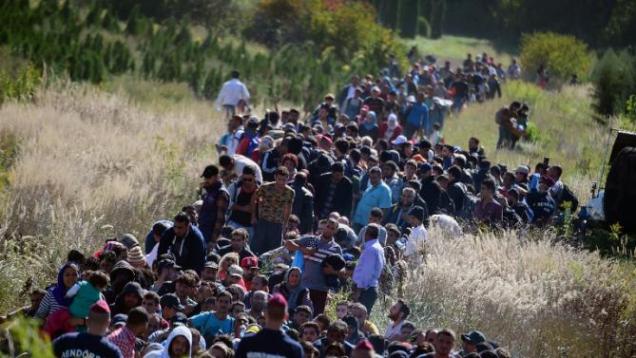Relocation Plan For Migrants Approved By EU
A relocation plan for 120,000 migrants was approved by European Union ministers as the bloc tries to deal with the current migrant crisis. The plan aims to remove part of the burden from countries like Italy and Greece, where thousands of migrants arrive each day.
The migrants are expected to be allocated to several EU countries. The relocation plan is on top of another plan to relocate around 40,000 refugees in Italy and Greece. Hungary, Slovakia, Romania and the Czech Republic voted against the plan while Finland abstained, according to a tweet from Milan Chovanec, the interior minister of the Czech Republic.
My, Slováci, Rumuni, Maďaři proti a Finsko se zdrželo. Usnesení bylo přijato.
— Milan Chovanec (@Milan_Chovanec) September 22, 2015
The agreement was approved by majority of the twenty-eight ministers present in the meeting, according to Interior Minister Bernard Cazeneuve of France. Cazeneuve said the decision shows how Europe can become responsible and progressive.
The 120,000 migrants included in the relocation plan represent a small part of the number of refugees who have travelled into Europe recently. This year saw 477,906 people reaching Europe through the sea, according to the UN refugee agency. The agency urged the EU to increase the number of migrants it plans to relocate. The agency also expects an expansion of the relocation plan.
UN High Commissioner for Refugees António Guterres said this may be the last chance for a united response from Europe in dealing with the migrant crisis, which resulted to the exploitation of migrants and refugees as well as disagreements among countries. Guterres added that the relocation plan may be insufficient in stabilizing the situation.
Another meeting is set to be held in Brussels to manage the worst refugee crisis in Europe since the Second World War. Hundreds of thousands of refugees are fleeing conflict from a number of countries, including Eritrea, Afghanistan, Syria and Iraq. The office of British Prime Minister David Cameron said he called Chancellor Angela Merkel of Germany to talk about the meeting.
The two leaders came into an agreement that the European Union should take into account a more extensive response to the migrant crisis, particularly how it can help the neighbors of Syria in dealing with the influx of migrants, support the political process in Syria, and strengthening the external borders of Europe. The same issues are expected to be discussed by Cameron with President Francois Hollande of France.
Hundred of migrants are staying at a wrestling arena in Edirne, which is around five miles from the border of Greece and Turkey. The migrants are keeping their hopes up of being allowed to enter Bulgaria or Greece and avoid a trip across the Mediterranean Sea. The Organization for Economic Cooperation and Development revealed that there is an increase in migration with Germany receiving the second-biggest number as it is expecting to receive around 800,000 migrants within the year.
The OECD revealed though the International Migration Outlook 2015 that it was difficult for European countries to reach a consensus in identifying and agreeing on provisional measures to take due to an expected adverse public reaction at the national level. The report revealed that dealing with the humanitarian crisis received most of the resources and it was necessary to continuously adjust legal migration systems.
Majority of migration into Europe still happens through legal channels and is organized, the report added. But, it also indicated that it was necessary for the integration of immigrants to be supported by public policies.
The parliament of Hungary passed a measure that would deploy the army to discourage refugees from entering its borders. The measure also allowed the use of non-lethal weapons by the army. The passing of the measure comes after ads were placed in Jordanian and Lebanese newspapers warning of jail time for illegal migrants. Prime Minister Viktor Orban of Hungary said the borders of Europe are beleaguered by millions of migrants.
